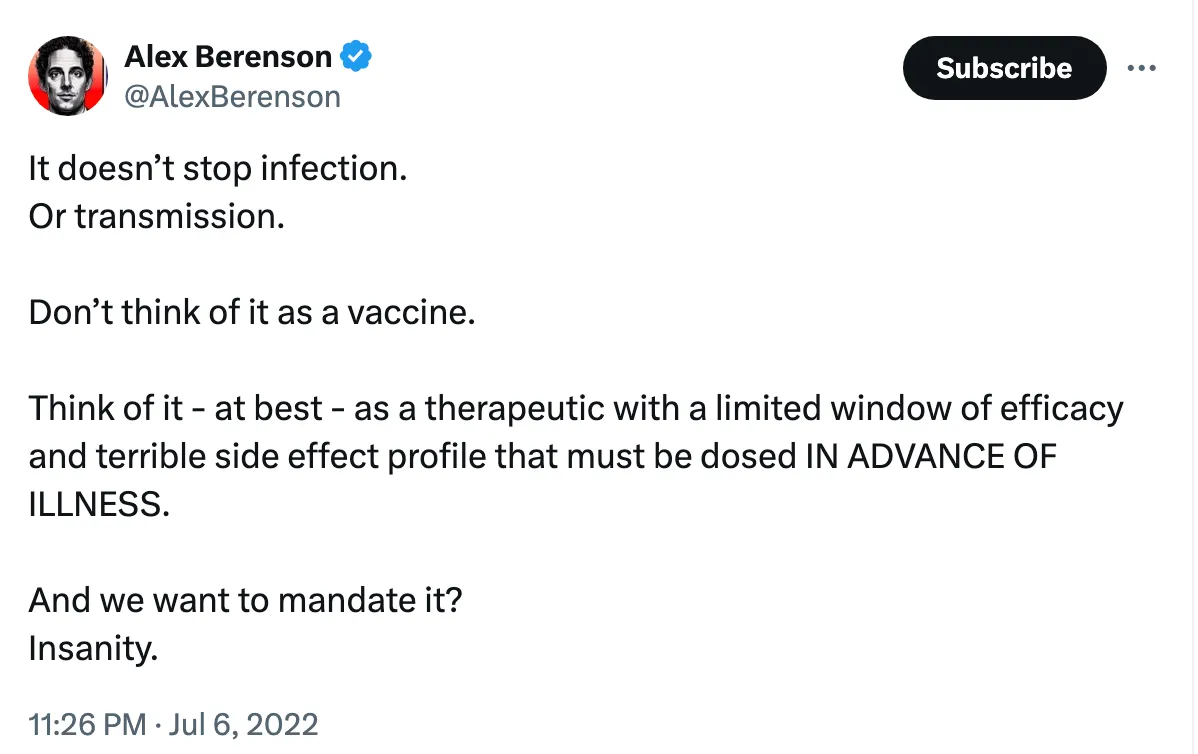Rebekah Barnett
The impartiality of the Federal Court is in question in light of allegations that a judge concealed her connections to pharmaceutical giant Pfizer before dismissing a legal challenge over its Covid vaccine.
Justice Helen Rofe provided counsel on Pfizer’s legal team on at least five separate occasions when she was working as a barrister (between 2003-2006), before she was appointed as a Federal Court Judge in 2021.
Potential conflicts allegedly undisclosed
Instructing solicitor Katie Ashby-Koppens, of NSW law firm PJ O’Brien & Associates, said that while Justice Rofe’s prior work for Pfizer is a matter of public record, at no point in the proceedings was Dr Fidge’s legal team advised of Her Honour’s potential conflicts, which only surfaced after the decision was handed down.
“Judges are duty bound to disclose not only potential conflicts, but also perceived conflicts. Failing to disclose this information is not just a breach of common courtesy, but is a breach of the judicial obligations of a sitting judge,” said Ashby-Koppens in a statement, noting that there were 16 other judges on the Federal Court Melbourne Registry who could have heard the case.
James Allan, Professor of Law at the University of Queensland, said there’s no question about what Justice Rofe should have done when presented with this case.
“She should have recused herself. The test is the appearance of bias. Even if the decision maker wasn’t biased, that’s not good enough. The threshold is the appearance of bias,” he told me for the Canberra Daily.
On 22 March, Dr Fidge’s lawyers lodged an official complaint with Federal Court Chief Justice Debra Mortimer, requesting an investigation into Justice Rofe’s conduct.
PJ O’Brien & Associates also requested that Justice Rofe’s decision to dismiss their case be quashed so that the matter can be heard afresh by a judge with no presenting conflicts.
However, Ashby-Koppens said that the Federal Court has advised that it will postpone dealing with the complaint until after Dr Fidge’s appeal has been processed.
Dr Fidge’s lawyers have appealed Justice Rofe’s dismissal as a matter of procedure, but they maintain that no appeal should be necessary because the decision is invalid due to Justice Rofe’s alleged concealment of potential conflicts.
The Federal Court was contacted for comment several times by email but did not respond.
Covid vaccine lawsuits blocked on technicalities
Justice Rofe’s dismissal of Dr Fidge’s lawsuit is the latest in a series of Covid vaccine-related cases dismissed by the courts on the basis of narrowly interpreted technicalities.
A lawsuit seeking to revoke the provisional approval of Moderna’s SPIKEVAX vaccine for babies and toddlers was dismissed, in an unprecedented in-chambers decision, on the basis that it would, “unduly divert the Court from its principal functions,” in March 2023.
This was despite the legal team (which included members of Dr Fidge’s legal team) highlighting to the High Court that the case involved “preventable deaths and injuries” of Australian babies and toddlers.
Another lawsuit seeking to prevent the administration of the Pfizer vaccine to children aged five to 11 was dismissed by the Federal Court on the issue of standing, in June 2022.
“It is concerning that where cases have been brought in respect of large pharmaceutical interests that the courts are not allowing the cases to get beyond first base, which means they do not hear the substance of the case or the evidence,” said Ashby-Koppens.
Separation of powers a ‘fiction’
The situation raises questions over whether the separation of powers in Australia is functioning as it should. In theory, state power is distributed amongst three institutions: the legislature, the executive, and the judiciary, with each branch keeping a check on the power of the others.
But this is a fiction, Professor of Law at Sheridan Institute of Higher Education, Augusto Zimmermann told me.
“There is no such a thing as separation of powers,” he said. “Australian judges are chosen by the government of the day. This obviously makes every judicial appointment inevitably political in nature and makes accountability impossible to achieve.”
Here, it comes to mind that Justice Robert Beech-Jones was appointed to the High Court of Australia in 2023 after deciding a highly consequential case (Kassam vs.Hazzard) challenging the NSW government’s pandemic public health orders – in the government’s favour.
That Justice Beech-Jones was touted to be short-listed for the High Court position prior to the hearing did not spur the judiciary, or the government, to request that he recuse himself for appearance of bias.
Call for a parliamentary investigation
Dr Fidge’s lawyers have sent copies of the formal complaint against Justice Rofe to all MPs and Senators, requesting a parliamentary investigation.
Under Section 72 of the Constitution, where potential misbehaviour of a judge has occurred, the parliament can investigate and, misbehaviour is proven, can remove the judge.
Non-profit Children’s Health Defense Australia has kicked off a campaign to educate Australians on Section 72 and equip them to petition MPs and Senators.
It is important to highlight that as Justice Rofe’s alleged concealment of former business with Pfizer is yet to be investigated, no misbehaviour has been proven at this time.
Some parliamentarians have taken notice. Senator Malcolm Roberts, of Pauline Hanson’s One Nation, said that the situation is “deeply concerning” and that “it doesn’t pass the pub test for contemporary Australian citizens.”
“I’ve had discussions with other members of parliament who share my concerns,” he said. “The federal Constitution’s Section 72 exists as a brake on any potential misbehaviour of the judiciary and has been used once before in federal matters.”
Visit www.Section72.au to find out more about the Children’s Health Defense campaign.
Pfizer in the hot seat
The stir over Justice Rofe’s alleged concealment of prior connections with Pfizer comes as the company is facing legal challenges on multiple fronts.
Two US states, Kansas and Texas, are suing the company for misleading over the safety and efficacy of its Covid vaccines, and for attempting to censor speech critical of its Covid vaccines. Utah, Kansas, Mississippi, and Louisiana are reportedly set to launch their own lawsuits against Pfizer soon.
In Europe, investigators from the European Public Prosecutor’s Office (EPPO) are looking into allegations of criminal wrongdoing in connection with Covid vaccine negotiations between EU Commission President Ursula von der Leyen and the CEO of Pfizer, Albert Bourla.
In Argentina, Dr Augusto Roux, a subject in Pfizer’s Covid vaccine trial, is getting around Pfizer’s blanket legal immunity by bringing criminal charges over alleged trial misconduct. Dr Roux suffered an adverse reaction in the Pfizer Covid vaccine trial, however there were multiple anomalies with the way that his reaction was recorded.
And back in the US, independent journalist Alex Berenson (formerly of the New York Times) is suing Pfizer board member Scott Gottlieb for allegedly pressing Twitter to ban him over factually accurate tweets criticising the mRNA vaccines. Berenson previously sued Twitter for wrongfully banning his account, settling with the social media company in 2022 for an undisclosed sum.

In the event that Dr Fidge’s case is eventually heard in an Australian court, it could pose the biggest scandal for Pfizer yet.
Dr Fidge alleges that the Pfizer and Moderna mRNA Covid vaccines contain unlicenced GMOs in two forms: modified RNA, and fragments of plasmid DNA contamination.
If proven true, this would have enormous implications for the health of Australians (and for the billions of people who took the mRNA vaccines around the world), and for the core medical principle of informed consent.
Problems already documented in the scientific literature arising from the modification of the synthetic mRNA include the creation of off-target proteins due to ‘frameshifting’ and the prospect of persistent spike protein production in the body of the vaccine recipient.
In an emerging area of research, scientists are concerned that fragments of DNA contamination delivered to cells in lipid nanoparticles (LNPs) can cause cardiac arrests, cancers, antibiotic resistance, autoimmune conditions, and even sudden deaths.
There is also putative evidence that Covid vaccine elements may be able to integrate with human genomic DNA, which regulators have vehemently assured cannot happen.
As it stands, the regulators responsible for the alleged GMO components of the vaccines deny everything. The Office of the Gene Technology Regulator denies that the mRNA vaccines contain GMOs, and the Therapeutic Goods Administration stated outright, in response to my questioning about DNA contamination last month, “The Pfizer COVID vaccine is not contaminated.”
However, it is reported that independent testing conducted on three Pfizer mRNA vaccine vials by Canadian scientist Dr David Speicher detected high levels of plasmid DNA contamination in all three vials (disclosure, the full report has not been released yet).
One can imagine that it would not be in Pfizer’s interests to have this material presented in the Federal Court of Australia.
*Edit 9 July 2024: A disclaimer has been inserted to emphasise that the allegations against Justice Rofe are not proven. “It is important to highlight that as Justice Rofe’s alleged concealment of former business with Pfizer is yet to be investigated, no misbehaviour has been proven at this time.”
This article was first published at Dystopia Down Under and Richardson Post.











